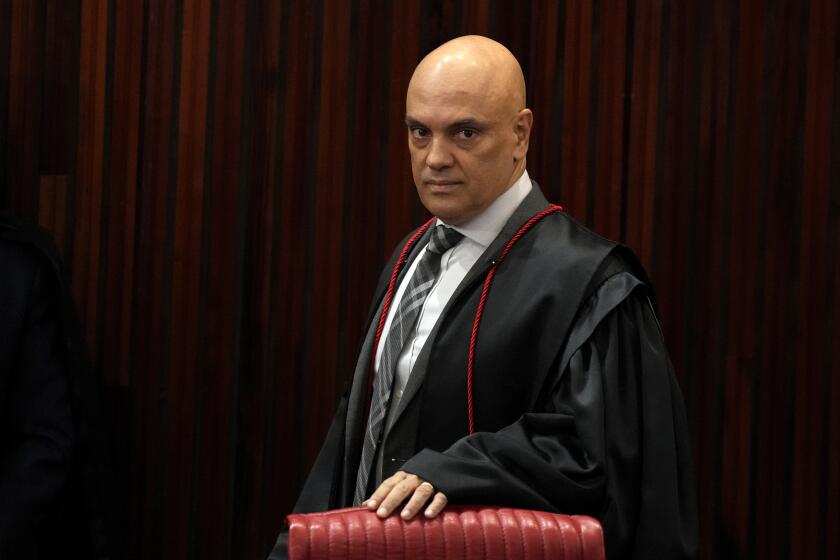SOUTHERN CALIFORNIA JOB MARKET : DEAD-END JOB? : Worried? Look What These Folks Once Did
So your career trajectory thus far has been less than meteoric. So no one in the workplace appreciates your unique talents. So instead of shattering the glass ceiling directly to fame, success and a punishing tax bracket, you’re stuck cleaning it.
Don’t despair. Even the rich, famous and successful have hit a few professional potholes on the road to greatness.
Sylvester Stallone was a gym teacher at the American College of Switzerland before finding his true--or at least more marketable--identity. Struggling actress Julia Roberts worked in an ice cream parlor; now she commands $7 million per picture. Former Columbia Pictures head Dawn Steel marketed Gucci toilet paper.
Maybe bad jobs do build character. Gov. Pete Wilson says he got his professional start at age 7--by getting up at 6 a.m. to feed chickens. Attorney Richard Riordan, considered one of Los Angeles’ most influential men, worked at a 7-Up plant putting bottles into a washer for the princely sum of 65 cents an hour.
“I still sometimes wake at night after nightmares of this experience,” he says.
David Kronemyer, vice president of business affairs at CEMA, parent of Capitol Records, is also a successful lawyer. He got useful field training 10 years ago trying to keep people from being institutionalized against their will.
“I think the bottom came one day when I was trying to make an argument to the jury that this particular woman I was representing was normal,” he recalls. “At one point, I recall turning to put my arm around her--only to find that she had lit the end of her Bic pen and was smoking it like a cigarette.”
Bad jobs can also put the value of schooling into perspective. For example, Edward M. Carson, chairman of First Interstate Bancorp., picked cantaloupes outside Phoenix as a teen-ager.
“It convinced me that working in an air-conditioned bank might be preferable to working in a non-air-conditioned field,” he says. “But my worst job in my banking career was sorting checks in alphabetical order by hand, which is how we did it in pre-computer days. I realized that my college degree had not adequately prepared me for working with the alphabet.”
Attorney Gloria Allred, president of the Women’s Equal Rights Legal Defense and Education Fund, recalls that for working women, low-paying jobs were virtually mandatory in the early 1960s, when she got into the job market.
“There weren’t that many things for a girl just out of college to do. We were teachers, nurses, flight attendants or secretaries. I interviewed for a job as an ad copywriter. Their only question was, ‘Can you type?’ I couldn’t type, but I could write.”
Famous writers fall into their own odd-job sub-category. Consider novelist T. Coraghessan Boyle; his job at a steakhouse called the Bum Steer, in Mahopac, N.Y., was to both butcher and cook the meat. As he recalls:
“The party of five wanted two blood raw, one medium medium, one converted to charcoal and one ‘Pittsed.’ (To ‘Pitts’ a steak--the term deriving from the town in which the dubious practice originated--was to suspend it six inches from the grill, after having wrapped it in slabs of fat hacked from a more civilized cut, and allow it to burst into flame in a impressive show of pyromaniacal zeal.)
“The result was a blackened, rock-hard ball of cinders, revealing, upon application of knife, fork and nut-cracker, a core both raw and cold.) The problem was, I inadvertently Pittsed just about everything that came across the grill.”
History indicates that dull white-collar work is somewhat more attractive to writers. Poet Wallace Stevens worked at a Hartford insurance concern. Novelist Anthony Trollope wrote while entrenched in the British Postal Service. Nathaniel Hawthorne supported himself at a U.S. Customs House, which he cannibalized in a hilarious sketch.
Indeed, bad jobs can be not just essential research material for later works, but an energizing obsession.
Gloria Steinem’s 1963 investigative article, “I Was a Playboy Bunny,” led her to conclude that “all women are bunnies.” Monologist Spalding Gray was so crushed by his inability to memorize lines for his bit part in “The Killing Fields” that he created a whole performance piece, “Swimming to Cambodia,” about it.
And without the essential blue-collar experiences of housewifery in trailer parks and waitressing in redneck dives, Roseanne Barr Arnold might not have a hit series on ABC today.
For others, bad jobs earlier in life provide colorful anecdotes from colorful lives; they make veritable oral histories. Take veteran comedian Buddy Hackett. Please.
Hackett still recalls a miserable night at a fancy club in Ft. Lee, N.J., in 1949, when he was forced to open for some bigger acts.
“To open is death--the audience is still eating,” he explains, adding that there was no turning back. “I had already ordered my tux.”
Before turning comic, Hackett was a boxer, earning $3 a fight in Coney Island, N.Y., and claims to have invented Victory bedsprings, which were popular during the war because they used so little metal.
Says Hackett: “Another thing I did was upholstery. My father and grandfather were upholsterers. At age 7, I became an apprentice upholsterer. At 16, my father told me to stop. ‘If you don’t, ‘ he said, ‘all you’ll ever have in this life is this hammer.’ ”
Finally, for some, their worst jobs are a badge of honor--a paean to the free enterprise system. An example is fast-food mogul Carl C. Karcher, founder and chairman of Carl Karcher Enterprises, which celebrates its 50th anniversary this year.
“I can’t say I’ve ever had a bad job. I think it’s fun to go to work,” Karcher says. “I started at a hot dog cart in Los Angeles, at Florence and Central. The date was July 17, 1941. I had been driving a bakery delivery truck when a customer of mine--at Hamburger on a Square on West Pico--told me it was for sale. I bought the cart (with Coleman starter stove) for $326--$15 out of pocket, $311 borrowed against my 1941 Plymouth.”
He adds: “My father used to say, ‘What’s the difference between can’t and can do? Can’t died in the poorhouse.’ I say, think positive. Success is a state of mind.”
So remember, no matter how menial or depressing your job, or how many bank calendars of chimpanzees in powder-blue leisure suits adorn the walls, consider it but a stepping stone to bigger and better things. Toss your head and say, “Success is a state of mind.”
And think what a great sitcom it’ll make in the year 2000.
More to Read
Inside the business of entertainment
The Wide Shot brings you news, analysis and insights on everything from streaming wars to production — and what it all means for the future.
You may occasionally receive promotional content from the Los Angeles Times.






